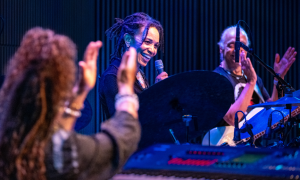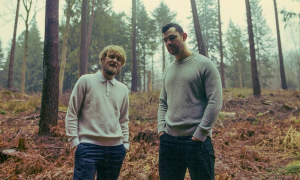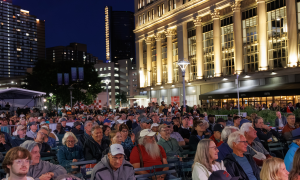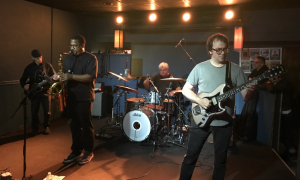Home » Jazz Articles » Live Review » Thomas Marriott Quartet at Jazz Alley
Thomas Marriott Quartet at Jazz Alley
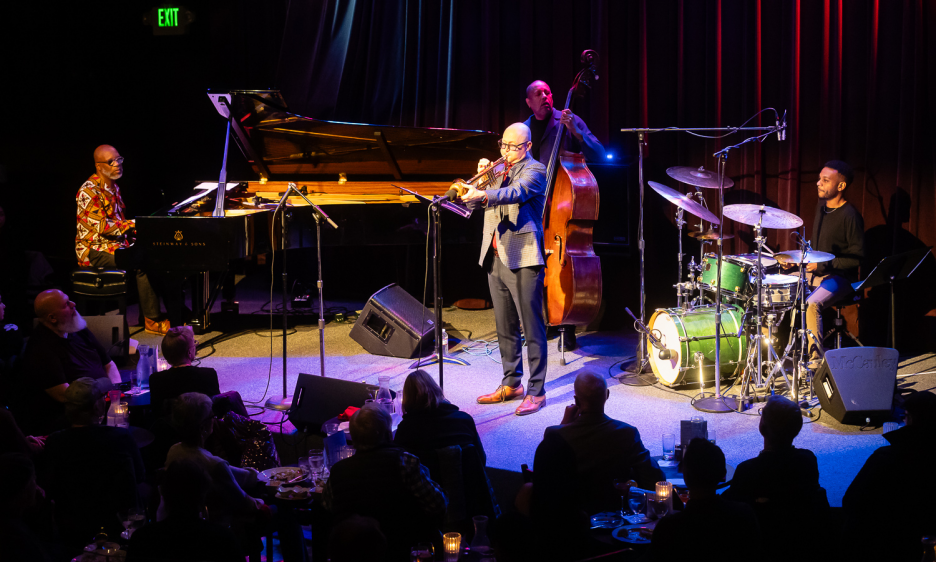
Courtesy Lisa Hagen Glynn
Jazz Alley
Seattle, WA
March 4, 2025
Dimitriou's Jazz Alley has been the mainstage for jazz touring acts coming through Seattle for more than four decades now. From humble beginnings in a small bistro on "the av" in the city's University district, to its now forty-year tenure in the current luxurious and large room in Belltown, Seattle jazz fans have had the opportunity to see the very best the genre has to offer on its grand stage. It was common in the early years of the venue to see international stars appear, backed by the best of the Seattle jazz scene. Local headliners were more apt to appear at clubs like the now shuttered Tula's Jazz Club just a few blocks away. In recent times, the club has been periodically featuring current resident artists from the historically rich scene in Seattle, including trumpeter

Thomas Marriott
trumpetb.1975
The occasion was to celebrate the release of Marriott's release, Screen Time (Imani, 2025), with the actual musicians he employed in the studio for his fifteenth album as a leader. Multi-Grammy-nominated pianist

Orrin Evans
pianob.1975

Robert Hurst
bass, acousticb.1964

Mark Whitfield, Jr.
drumsThe thematic setting for Marriott's Screen Time is music from screens "big and small." according to the trumpeter, with two originals mixed in that in themselves have a screen-based theme. The large audience included a lot of faces familiar to the evening's headliner—family, friends, fellow musicians, and many who have been acquainted in some way with him over his now twenty-year tenure as a major force in Seattle jazz. His founding and operation of the Seattle Jazz Fellowship, a non-profit in support of local jazz has put him front and center with several generations of jazz enthusiasts in the city, a faction of fandom well represented on this particular evening's performance.
For those not acquainted with Marriott personally, the idea of playing music such as Fred Rogers' "It's Such a Good Feeling" may seem mildly amusing, even without knowledge of his particular sense of humor. But much like he did with his album, Romance Language (Origin, 2018), Marriott has a penchant for finding great melodies in odd places, in this case from movies and television shows. The evening's opener, "Summer Nights," is a direct case in point. The piece comes from the 1936 musical, "Sing Me a Love Song, and while not recognized as such, is exactly the type of show tune apt to become a jazz standard, or a contrafact of one. The band seemed to broach the tune gingerly at first, with things unwinding with solos all around in full swing mode.
Of course, what setlist of screen favorites would be complete without a love song? While we are at it, why not something darkly sumptuous as Allen Silvestre's "Goodbye / Love Theme from 'Predator?'" Indeed, the quartet launched into the tune in a vamp groove, with Marriott probing the melody muted. He then shed the mute and launched into a dynamic solo, not quite fully revealing his full range. Evans followed with a whole new harmonic spin to the piece, blending chordal phrases with short quicksilver bursts.
The vibe on stage was slowly releasing into a comfort zone when they launched into "Front Row Family," an aptly titled piece considering the audience for this opening set of a two-night run. The sound of the tune is vintage Marriott, having nothing to do with screens of any kind. "In fact, it's not even on the album," cited Marriott with a laugh. The trumpeter is known for his full-bodied sound, something that this tune brought to the surface. Whitfield's unique kit setup also came into play, with a second snare deeply tuned and an added crash cymbal. The drummer, just off a cross-country flight from New York, performed spectacularly, yet with artistic balance and joyful ease.
The aforementioned Rogers piece was introduced by a quiet, thoughtful entry by Evans that eventually landed on the opening of the piece. Marriott entered muted as a storyteller, forming his lines around the entirety of the sounds around him. Hurst's playing on this piece, while not his featured high point of the performance, was largely impactful in the overall sound of the quartet and its dynamic personality. This statement could be made at any moment of the set, his elegant sound, perfect tonality and artistic sensibility present throughout.
Marriott's two originals from Screen Time brought out the best of the band in terms of swinging like mad, and getting off the leash a bit. "Skip Intro," and the title piece found the trumpeter playing bold, lightning quick lines that covered the full range of his instrument. There is not a better pianist to have behind you under these conditions than Evans, the two having developed a chemistry that can only be found over time. These two pieces gave all four members equal footing and input, and provided the audience with perhaps the best glimpse of Marriott as a complete jazz artist, doing so with a quartet of jazz heavyweights on his own home turf. The overall vibe of the evening was deeply embedded in these two original gems from the headliner.
Randy Newman's "Dexter's Tune," a song that has been recorded by both Marriott and Evans was skillfully articulated, with the written melody having precedence in Marriott's muted solo, backed by Whitfield's steep backbeat. The theme from "Reading Rainbow," the popular PBS series, found a contemplative Evans being gently nudged by Whitfield into the orchestral heart of the piece. It was an interesting departure in a way for Marriott, whose recordings and performances typically are interpretations of his original tunes that tend to fall on the post-bop side of things. Not that this performance strayed from that credo at all—after all, it would be difficult to imagine a better setting for the trumpeter to thrive, to show his audience a total sense of his artistry. The band, the room, the audience, saw the cosmic tumblers of the universe click into place on this evening, in that regard. Taking the band out for the final piece, Marriott called his original tune, "Big Brother," a rollicking melody that has been played and played again over time by the trumpeter.
If you truly wanted to gauge the vibe of a room, the hang after the performance spoke loudly to that end. There was a lovely warmth to the fellowship that followed this performance that provided everyone present with an emotional lift and reason to remain hopeful and joyful in these most challenging of times.
Tags
Live Review
Thomas Marriott
Paul Rauch
United States
Washington
Seattle
Jazz Alley
Orrin Evans
Robert Hurst
Mark Whitfield Jr.
Seattle Jazz Fellowship
Comments
PREVIOUS / NEXT
Thomas Marriott Concerts
Sep
23
Tue
Freefall
Seattle Jazz FellowshipSeattle, WA
Oct
7
Tue
Freefall
Seattle Jazz FellowshipSeattle, WA
Oct
21
Tue
Freefall
Seattle Jazz FellowshipSeattle, WA
Nov
4
Tue
Freefall
Seattle Jazz FellowshipSeattle, WA
Nov
18
Tue
Freefall
Seattle Jazz FellowshipSeattle, WA
Dec
2
Tue
Freefall
Seattle Jazz FellowshipSeattle, WA
Dec
16
Tue
Freefall
Seattle Jazz FellowshipSeattle, WA
Support All About Jazz
 All About Jazz has been a pillar of jazz since 1995, championing it as an art form and, more importantly, supporting the musicians who make it. Our enduring commitment has made "AAJ" one of the most culturally important websites of its kind, read by hundreds of thousands of fans, musicians and industry figures every month.
All About Jazz has been a pillar of jazz since 1995, championing it as an art form and, more importantly, supporting the musicians who make it. Our enduring commitment has made "AAJ" one of the most culturally important websites of its kind, read by hundreds of thousands of fans, musicians and industry figures every month.
Go Ad Free!
To maintain our platform while developing new means to foster jazz discovery and connectivity, we need your help. You can become a sustaining member for as little as $20 and in return, we'll immediately hide those pesky ads plus provide access to future articles for a full year. This winning combination vastly improves your AAJ experience and allow us to vigorously build on the pioneering work we first started in 1995. So enjoy an ad-free AAJ experience and help us remain a positive beacon for jazz by making a donation today.

Seattle
Concert Guide | Venue Guide | Local Businesses
| More...








 Buy Now
Buy Now


